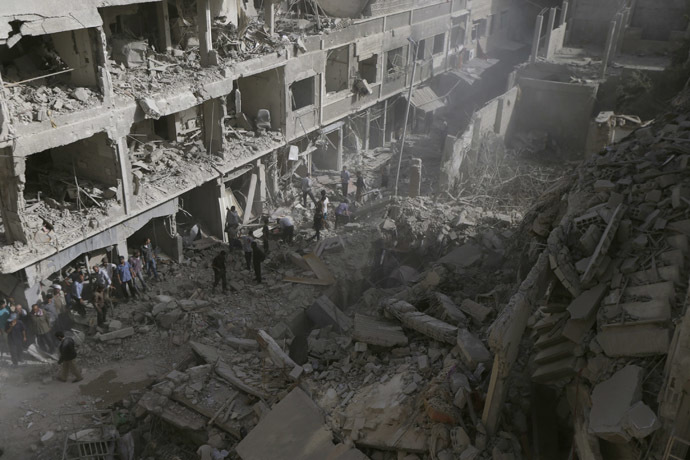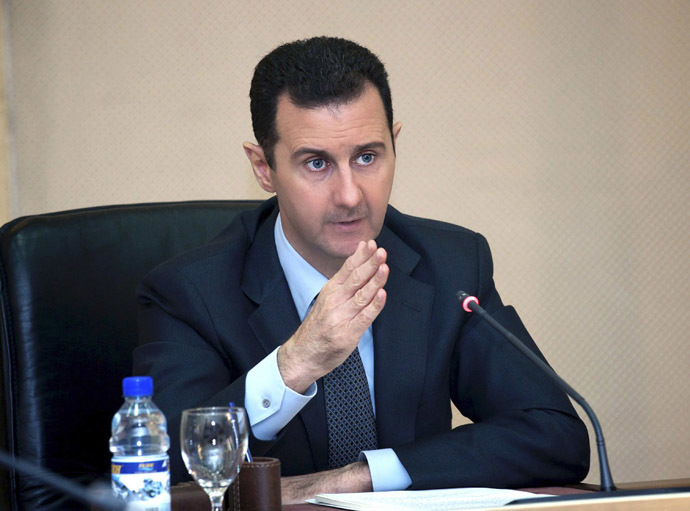by Georgi Stankov, September 26, 2014
There are two major conflicts that determine the outcome of this planet and mankind in the End Times, on the eve of our Ascension, the MPR and the ID shift of Gaia – Ukraine and the Middle East. While the Ukrainian conflict has been by and large won by the Prorussian insurgents and the West already knows that it has lost its war against Russia, the Middle East conflict is much more complex and dangerous.
While it seems that at present the USA has gained the upper hand and has started bombing Iraq and Syria, two sovereign countries, in a total breach with all international laws, but with little opposition on the part of its adversary Russia, the chances are that Obama will fail in an even more spectacular manner than his predecessor Bush did in Afghanistan and Iraq, but also in Syria and in any other country, which the USA has invaded or bombed since WW2.. You do not need to be a great prophet or a political expert to predict the American fiasco in the Middle East.
I could bring forward many excellent arguments from a conventional point of view, why the Peace Nobel Prize Winner, the Bomber Obama, has absolutely no chance to win his war against ISIS in Syria and Iraq, and that all facts on the ground speak that the USA will lose this war even more dreadfully than the Vietnam war. The following article below does this instead of me in a very lucid and educated manner.
At this place, I will simply reiterate what I have already said in my previous article of today – Obama and the USA will lose their war in the Middle East because we, the new Logos Gods and Guardians of the new Galaxy, have decided so. The war machine of the Empire of Evil must come to a halt in the End Time.
The defeat of the USA in Ukraine and the Middle East will pave the way for the final demise of the ruling dark elite in the West and will trigger the new era of revelations and enlightenment. This process will start, while this matrix will begin to crumble, and will continue under more favourable conditions in the new 4D worlds after the ID shift, and after the current Orion matrix has disappeared in the deluge of the MPR.
The defeat of the USA war machine in Iraq and Syria will happen much quicker than many expect. The article below explains why.
For me personally, the main reason why the Empire of Evil will be defeated is that it has no army at all. Since more than ten years the best hidden secret is the recruitment numbers of US soldiers. The American nation is tired of leading wars the world over and the Americans no longer want to die for a criminal government that only wants to enslave its own citizens at home.
If now Obama says, in a seeming conflict with his commanders, that there will be no boots on the ground in Iraq and Syria, this is not a sign of his “peaceful” nature, as he has no characteristics at all – he is an empty, soulless duplicate (or most probably already a clone) and a marionette of the hidden dark US government. Rather it is true that the USA has no army to enforce its foreign policy of world hegemony.
The more evident this fact becomes, the louder the war-mongering yelling of Obama and Co. This is what happened in the Ukraine conflict before the USA and EU lost their war against Russia, and this same outcome will inevitably be repeated in the current Middle East war against the CIA-sponsored ISIS. Because such is the divine plan for this planet in the End Time and because such are the facts on the ground. And because this is our will.
The Russians know this and they patiently wait for the American fiasco in Syria and Iraq. For this reason they are not at all upset about this lawless American aggression, although they have condemned it in strong diplomatic terms. In fact, the USA has just made the greatest gift to Putin with their decision to bomb ISIS. This military involvement will bind all American forces and attention in a hopeless war and Russia will easily materialize its final victory in Ukraine – the toppling of the current Nazi Junta in Kiev and the proclamation of a new independent Novorussian republic from Donetsk to Moldavia. In case the MPR will not come first, which is most likely.
I am only giving you here the most probable political and military developments in the coming days and weeks. All this will happen as suddenly and as rapidly as the Fall of the Iron Curtain 25 years ago and will throw the West in a state of total shock that will trigger in its turn the collapse of the old Orion matrix. This will be the most likely scenario, which you should expect in the coming days.
We live indeed in the most exciting and auspicious time in the history of mankind and you should not miss any bit of this grandiose show, only because you do not believe in such an outcome and have put blinders on your eyes, as was the case with all so called “experts”, politicians and journalists when the Iron Wall fell all of a sudden and they were caught off guard. The condiment of this show is to anticipate the next act and still be overwhelmed by the magnificence of the unfolding drama.
__________________________
Coalition of the Clueless
by Sharmine Narwani, September 25, 2014
http://rt.com/op-edge/190684-syria-coalition-airstrikes-isis/
This US-engineered Coalition is in for some surprises. With few common goals, it has thrust itself into battle against the most determined players in the region and beyond.
The airwaves are still heaving with spin two days after US airstrikes against Syria.
Undoubtedly the attacks were timed to occur on the eve of the annual gathering of world leaders at the United Nations, so ‘Coalition’ partners could cluster behind the decision to bomb a sovereign state, uninvited.
The irony, of course, is that they are doing so at the UN – the global political body that pledges to uphold international law, peace and stability, and the sanctity of the nation-state unit.
The goal this week will be to keep the ‘momentum’ on a ‘narrative’ until it sinks in.
On day one, heads of state from Turkey, Jordan, Qatar, the UK and France were paraded onto the podium to drum in the urgency of American strikes against the Islamic State of Iraq and the Levant (ISIL), Jabhat al-Nusra and other militant groups inside Syria.
Every American official – past and present – in the White House rolodex was hooked up to a microphone to deliver canned sound bites and drive home those ‘messages.’ In between, video-game-quality footage of US strikes hitting their targets was aired on the hour; clips of sleek fighter jets refueling midair and the lone Arab female fighter pilot were dropped calculatingly into social media networks.

The global crew of journalists that descends annually on the UN for this star-studded political event, enthused over US President Barak Obama’s ability to forge a coalition that included five Arab Sunni states – Saudi Arabia, Qatar, Jordan, Bahrain and the UAE.
Few mentioned that these partners are a mere fig leaf for Obama, providing his Syria campaign with Arab and Muslim legitimacy where he otherwise would have none. Not that any of these five monarchies enjoy ‘legitimacy’ in their own kingdoms – kings and emirs aren’t elected after all – and two of these Wahhabi states are directly responsible for the growth and proliferation of the Wahhabi-style extremism targeted by US missiles.
Even fewer spent time dissecting the legality of US attacks on Syria or on details of the US ‘mission’ – as in, “what next?”
But with a mission this crippled at the outset, it didn’t take long for an alternative view to peek through the thick media fog.
On the ground in Syria, dead civilians – some of them children killed by US bombs – muddied the perfect script. Confused Syrian rebels – many who had called for foreign intervention to help crush the government of Syrian President Bashar al-Assad – demanded to know how these airstrikes were meant to help them.
Sunni Arabs would be radicalized by these strikes, they warned, as ideologically sympathetic citizens of the Arab coalition states took to their information channels and swore revenge for airstrikes against ISIL and al-Nusra.
The Syrian government, for the most part, remained mute – whether to save face or because they could ‘smell’ the gains coming. Contrary to Washington’s prevailing narrative, privately the story was that the US had informed the Assad government of both the timing and targets of the attacks in advance.

Sources say that the US even provided ‘guarantees’ that no Syrian military or government interests would be targeted. A Reuters exclusive claiming that the US went so far as to provide assurances to Iran, suggests this version is closer to the truth. When US airstrikes against Syria were on the table a year ago, the various parties went through a similar game of footsies. Last September, the Americans backed off – allegedly because of communications from their adversaries that even a single US missile would trigger a warfront against Israel. This time, Washington needed to know that scenario was not going to be activated, and this week they offered the necessary guarantees to ensure it.
Although the Russians and Iranians have publicly lashed out at the illegality of US strikes, they do not seem too worried. Both know – like the Syrian government – that these air attacks could be a net gain for their ‘Axis.’
Firstly, the United States is now doing some useful heavy-lifting for Assad, at no real cost to him. The Syrian armed forces have spent little time on the ISIL threat because their focus has traditionally been on protecting their interests in Aleppo, Damascus, Homs, Hama – and the countryside in these areas – as well as towns and cities around the Lebanese and Jordanian borders. That changed when ISIL staged successful attacks on Mosul and created new geopolitical urgency for Assad’s allies – which triggered some major Syrian strikes against ISIL targets.
But to continue along this path, the Syrians would have to divert energy and resources from key battles, and so the American strikes have provided a convenient solution for the time being.
Secondly, the Syrians have spent three years unsuccessfully pushing their narrative that the terrorism threat they face internally is going to become a regional and global problem. The US campaign is a Godsend in this respect – Obama has managed to get the whole world singing from the same hymn sheet in just two months, including, and this is important, the three states – Saudi Arabia, Qatar and Turkey – most instrumental in financing, weaponizing and assisting ISIL and other extremist militias inside Syria.
Syria, Iran, Russia, Hezbollah and a host of like-minded emerging powers are pleased about this new laser focus on jihadi terror and for the accompanying resource shift to address the problem.
Thirdly, the US has now been placed in the hot seat and will be expected to match words with action. For three years, Washington has overlooked and even encouraged illegal and dangerous behaviors from its regional Sunni allies – all in service of defeating Assad. With all eyes on America and expectations that Obama will fail in his War on Terror just like his predecessors, the US is going to have to pull some impressive tricks from its sleeves.

Ideally, these would include the shutting down of key border crossings (Turkey, Jordan, Lebanon); punishing financiers of terror and inhibiting the flow of funds and assistance from Washington’s regional allies; cutting off key revenue streams; tightening immigration policies to stem the flow of foreign fighters; disrupting communications networks of targeted terrorist groups; broader intelligence sharing with all regional players; and empowering existing armies and allied militias inside the ‘chaos zone’ to lead and execute ground operations.
Thus far, there are signs that some of these things are already happening, with possibly more to come.
Now for the fun part. The Syrians, Iranians and Russians do not fundamentally trust Washington or its intentions. The suspicion is that the US is on another one of its regime-change missions, displaying its usual rogue-state behavior by violating the territorial integrity of a sovereign state under false pretenses, and that it will shortly revert to targeting the Syrian government.
While they can see clear gains from the current level of US intervention – as distasteful as they find it – they are watching carefully as events unfold.
If there is the slightest deviation from the ‘guarantees’ provided by the US, this trio has plenty of room to maneuver. Iran, for one, has dallied with the Americans in both Iraq and Afghanistan and they know how to cause some pain where it counts. The Russians, for that matter, have many playgrounds in which to thwart US ambitions – most urgently in Ukraine and in Afghanistan, from which the US hopes to withdraw billions of dollars’ worth of military equipment by the end of 2014.
All understand that Washington has just assumed a risky public posture and that many, many things can go wrong. The Sunni Arab fig leaf can disappear in a nano-second if domestic pressures mount or revenge attacks take place internally. Information could leak about continued assistance to terrorist militias from one or more of its coalition partners – a huge embarrassment for Washington and its wobbly Coalition. ISIL will almost certainly act against coalition partner soft-targets, like carrying out further kidnappings and executions. Continued airstrikes will almost definitely result in a growing civilian casualty count, turning those ‘hearts and minds’ to stone. Syrian rebels could swiftly turn against the US intervention and radicalize further. Massive displacement caused by airstrikes could exacerbate the humanitarian crisis.And as in all other past US military War-on-Terror adventures, terrorism could thrive and proliferate in quantum leaps.
As Moscow-based political analyst Vladimir Frolov noted to the Washington Post: “The United States has underestimated the complexity of the situation before, so let’s just wait until they run into problems.”

The idea that US military engagement could continue for the long-term is unlikely given the myriad things that can go wrong fast. Obama is going to be reluctant to have his last two years in office defined by the hazardous Syrian conflict – after all, he was to be the president who extracted America from unessential wars.
But the most compelling reason that this Coalition will not pass the first hurdle is that its key members have entirely different ambitions and strategic targets.
Over a decade ago, these US-engineered coalitions were wealthier, less-burdened and shared common goals. Today, many of the coalition members face domestic economic and political uncertainties – and several states are directly responsible for giving rise to ISIL. How can the Coalition fight ISIL and support it, all at once?
What’s missing is a formula, a strategy, a unified worldview that can be equally as determined as the ideological adversary it faces.
Down the road, we will discover that the only coalition able and willing to fight extremism does indeed come from inside the region, but importantly, from within the conflict zone itself: Lebanon, Syria, Iraq and Iran. For starters, they are utterly vested in the outcome of their efforts – and would lead with political solutions alongside military ones. Those elusive boots-on-the-ground that everyone is seeking? They live it. Pit that group against Obama’s Coalition-of-the-Clueless any day and you know which side would win handily.
The question is, can this Coalition stomach a solution it is working so hard to avoid? Will it partner with vital regional players that were foes only a few months ago? It is doubtful. That would require a worldview shift that Washington is still too irrational to embrace.
Sharmine Narwani is a commentator and analyst of Middle East geopolitics.

